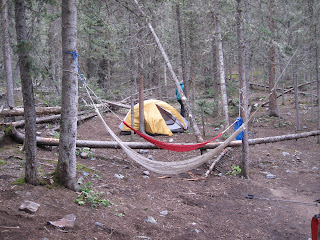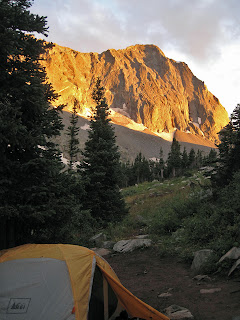 |
| Campsite in the Maroon Bells-Snowmass Wilderness |
The basic idea of "No Trace" camping is to leave the area in which you travel/camp in the same, no scratch that, better condition than when you arrived. While in truth it may be impossible to truly leave no trace, smart no-trace travel will minimize the impact we leave on the environment we visit. Considering the amount of time you have to spend to get some of these places, I would assume that you enjoy and probably respect them and therefore should have a stake in seeing them preserved the way the are. Trash, off-trail thrashing, and reckless camping can leave ugly, conspicuous, and very long-lasting damage. The following guidelines can teach you how to avoid contributing to this type of inconsiderate destruction and help preserve these amazing places for many years to come.
Knowledge/Preparation
One component of no-trace ethic that may seem surprising is knowledge and preparation. If you plan to travel in the backcountry you should seek research from as many sources as you can. While some feel like too much research ruins the authentic and adventurous spirit of a wilderness experience, understanding the specific features of your destination, including physical topography, trail systems, flora and fauna, weather, etc, will make your experience safer and, thus, have less impact on the environment as well. Alpine rescues can be costly to both you and the environment. Remember, the best defense is a good offense. Stay proactive and lessen the chances of an accident.
Durable surfaces
Stick to durable surfaces suck as trails, exposed dirt, rock, etc, when traveling and camping. Avoid going off trail, many alpine environments are very fragile and just a few off-trail feet can cause damage that takes decades to repair. Don't camp in grasses or plants; doing so just one time could kill many fragile plants, especially in the alpine tundra zone.
 |
| Campsite in the Weminuche Wilderness area |
Pack out all trash, even the smallest pieces. Human waste is more difficult. Pack it out if you can, there are several products in existence to aid with this unpleasant prospect. This can be difficult on longer backpack trips. If you must, dig a hole at least six inches deep. Minimize use of toilet paper and pack out. In a pinch bury the toilet paper along with feces. Disguise your "cat-hole" when you are done.
Take nothing but photos
Do not take anything out of the wilderness environment, not even small stones. You might argue that there are so many rocks that even if everybody took one there would be plenty to go around, but it's just not a good practice. Avoid.
Campfires
While a good wilderness campfire is hard to beat, campfires are damaging to the environment in a number of potential ways. For one, stones used in a campfire ring are permanently marred by their time served with those flames. True no trace camping would shun any such defacement. Fuel for a fire is also a problem. Cutting living trees is surely off limits, and collecting deadfall is even a problem too, as many organisms such as termites and various fungi rely on that deadfall to play their role in the eco-system. The other danger of a campfire is that one that is poorly attended, or even one that is being well supervised but in a sudden strong breeze, can possibly loose control and spark a wildfire. This has happened many times, often to devastating results. The 2002 Hayman Fire which went on to burn 138,000 acres and become Colorado's largest wildfire was caused by a reckless campfire.
 |
| Sunset camp near Capitol Peak |
Respect the wildlife and leave them to be. Don't feed the animals, either intentionally or unintentionally by poorly storing your food cache. This disrupts their ability to find food for themselves in the wild and will increase the likelihood of human-animal encounters later on the road, often ending dangerously for both animal and human.
Other humans
Respect other humans you encounter in the wilderness by not encroaching on their campsite and maintaining a reasonable volume at appropriate times. Remember, even if you want to celebrate your ascent of Longs Peak at camp that night, your neighbor might be getting up at 2 am to go for a summit bid himself. Be respectful!
Visit THE ARCHIVE: A list of most of our articles sorted by department

No comments:
Post a Comment